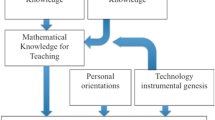Abstract
Whilst research on the teaching of mathematics and the preparation of teachers of mathematics has been of major concern in our field for some decades, one can see a proliferation of such studies and of theories in relation to that work in recent years. This article is a reaction to the other papers in this special issue but I attempt, at the same time, to offer a different perspective. I examine first the theories of learning that are either explicitly or implicitly presented, noting the need for such theories in relation to teacher learning, separating them into: socio-cultural theories; Piagetian theory; and learning from practice. I go on to discuss the role of social and individual perspectives in authors’ approach. In the final section I consider the nature of the knowledge labelled as mathematical knowledge for teaching (MKT). I suggest that there is an implied telos about ‘good teaching’ in much of our research and that perhaps the challenge is to study what happens in practice and offer multiple stories of that practice in the spirit of “wild profusion” (Lather in Getting lost: Feminist efforts towards a double(d) science. SUNY Press, New York, 2007).
Similar content being viewed by others
References
Barwell, R. (2013). Discursive psychology as an alternative perspective on mathematics teacher knowledge. ZDM - The International Journal on Mathematics Education, 45(4), this issue. doi:10.1007/s11858-013-0508-4.
Brown, T., Heywood, D., Solomon, Y. & Zagorianakos, A. (2013). Experiencing the space we share: rethinking subjectivity and objectivity. ZDM - The International Journal on Mathematics Education, 45(4), this issue. doi:10.1007/s11858-012-0478-y.
Cooper, B., & Dunne, M. (2000). Assessing children’s mathematical knowledge: social class, sex and problem-solving. Buckingham: Open University Press.
Doerr, H., & Lerman, S. (2010). Teachers learning from their teaching: the case of communicative practices. In R. Zazkis & R. Leikin (Eds.), Learning through teaching mathematics: Development of teachers’ knowledge and expertise in practice (pp. 247–262). Dordrecht: Springer.
Ensor, P. (2001). From preservice mathematics teacher education to beginning teaching: a study in recontextualizing. Journal for Research in Mathematics Education, 32(3), 296–320.
Gellert, U., Espinoza, L. & Barbé, J. (2013). Being a mathematics teacher in times of reform. ZDM - The International Journal on Mathematics Education, 45(4), this issue. doi:10.1007/s11858-013-0499-1.
Goos, M. (2013). Sociocultural perspectives in research on and with mathematics teachers: a zone theory approach. ZDM - The International Journal on Mathematics Education, 45(4), this issue. doi:10.1007/s11858-012-0477-z.
Jaworski, B., Robinson, C., Matthews, J., & Croft, T. (2013). An activity theory analysis of teaching goals versus student epistemological positions. International Journal for Technology in Mathematics Education, 20(1), 147–152.
Kanes, C., & Lerman, S. (2008). Developing the concept of community of practice. In A. Watson & P. Winbourne (Eds.), New directions for situated cognition in mathematics education (pp. 310–326). New York: Springer.
Lather, P. (2007). Getting lost: Feminist efforts towards a double(d) science. New York: SUNY Press.
Lerman, S. (1986). Alternative views of the nature of mathematics and their possible influence on the teaching of mathematics. Unpublished PhD Dissertation, King’s College London.
Lerman, S. (1997). The psychology of mathematics teachers’ learning: in search of theory. In E. Pehkonen (Ed.), Proceedings of twenty-first meeting of international group for the psychology of mathematics education (Vol. 3, pp. 200–207). Lahti, Finland.
Lerman, S. (1998). A moment in the zoom of a lens: towards a discursive psychology of mathematics teaching and learning. In A. Olivier & K. Newstead (Eds.), Proceedings of the Twenty-second Annual Meeting of the International Group for the Psychology of Mathematics Education (Vol. 1, pp. 66–81), Stellenbosch, South Africa.
Lerman, S. (2000). The social turn in mathematics education research. In J. Boaler (Ed.), Multiple perspectives on mathematics teaching and learning (pp. 19–44). Westport: Ablex.
Lerman, S. (2002). Situating research on mathematics teachers’ beliefs and on change. In G. C. Leder, E. Pehkonen, & G. Törner (Eds.), Beliefs: A hidden variable in mathematics education? (pp. 233–243). Dordrecht: Kluwer.
Lerman, S. (2010). Theories of mathematics education: is plurality a problem? In B. Sriraman & L. English (Eds.), Theories of mathematics education (pp. 99–110). New York: Springer.
Lerman, S. (2013). Technology, mathematics and activity theory. The International Journal for Technology in Mathematics Education, 20(1), 39–42.
Meira, L., & Lerman, S. (2009). Zones of proximal development as fields for communication and dialogue. In C. Lightfoot & M. C. D. P. Lyra (Eds.), Challenges and strategies for studying human development in cultural contexts (pp. 199–219). Rome: Firera Publishing.
Piaget, J. (1980). Adaptation and intelligence (S. Eames, trans.). Chicago: University of Chicago Press. (Original published 1974.).
Popkewitz, T. S. (2000). Educational knowledge: Changing relationships between the State, civil society and the educational community. New York: SUNY Press.
Potari, D. (2013). The relationship of theory and practice in mathematics teacher professional development: an activity theory perspective. ZDM - The International Journal on Mathematics Education, 45(4), this issue. doi:10.1007/s11858-013-0498-2.
Scheurich, J. J. (1997). Researching in the postmodern. London: Routledge Falmer.
Schoenfeld, A. (2013). Classroom observations in theory and practice. ZDM - The International Journal on Mathematics Education, 45(4), this issue. doi:10.1007/s11858-012-0483-1.
Simon, M. (2013). Promoting fundamental change in mathematics teaching: a theoretical, methodological, and empirical approach to the problem. ZDM - The International Journal on Mathematics Education, 45(4), this issue. doi:10.1007/s11858-013-0486-6.
Skott, J. (2013). Understanding the role of the teacher in emerging classroom practices: searching for patterns of participation. ZDM - The International Journal on Mathematics Education, 45(4), this issue. doi:10.1007/s11858-013-0500-z.
Van Zoest, L., & Thames, M. (2013). Building coherence in research on mathematics teacher characteristics by developing practice-based approaches. ZDM - The International Journal on Mathematics Education, 45(4), this issue. doi:10.1007/s11858-013-0491-9.
Author information
Authors and Affiliations
Corresponding author
Rights and permissions
About this article
Cite this article
Lerman, S. Theories in practice: mathematics teaching and mathematics teacher education. ZDM Mathematics Education 45, 623–631 (2013). https://doi.org/10.1007/s11858-013-0510-x
Accepted:
Published:
Issue Date:
DOI: https://doi.org/10.1007/s11858-013-0510-x




